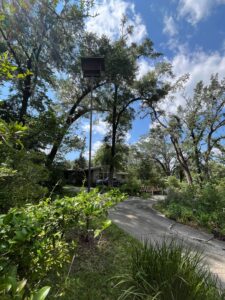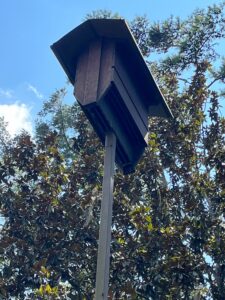After Tornadoes, Bats Find New Home in Tallahassee Bat House
Words and photos by Thomas Eason, Live Wildly Senior Director, Conservation
In a testament to nature’s resilience, hundreds of Brazilian free-tailed bats have recently made a new home in a bat house in Tallahassee. This unexpected development followed damage caused by the two tornadoes that swept through my neighborhood earlier this year.
 Brazilian free-tailed bats (scientific name Tadarida brasiliensis), known for their remarkable agility and speed, are an essential part of the local ecosystem. These bats are nocturnal insectivores, consuming vast quantities of insects each night, which helps curb mosquitos and other pests in the area. Their sudden relocation to a previously installed bat house not only highlights their adaptability but also underscores the importance of bat conservation efforts.
Brazilian free-tailed bats (scientific name Tadarida brasiliensis), known for their remarkable agility and speed, are an essential part of the local ecosystem. These bats are nocturnal insectivores, consuming vast quantities of insects each night, which helps curb mosquitos and other pests in the area. Their sudden relocation to a previously installed bat house not only highlights their adaptability but also underscores the importance of bat conservation efforts.
The tornadoes that impacted the community likely led to the loss of roosting sites used by the bats. The loss of these roosts could have had severe consequences for the local bat population, disrupting their breeding cycles and feeding patterns. However, the previously vacant bat house appears to have provided a timely and effective solution.
Bat houses, designed to mimic natural roosting sites, offer a safe and stable environment for bats to rest and rear their young. The timing of this relocation is particularly fortuitous, as the bats are currently in their breeding season. The bat house’s structure provides them with the room and protection needed to raise their young in safety. The presence of hundreds of bats in this new roost is gratifying to the homeowners who installed the bat house after they moved in nearly a decade ago. It is common for bats to take years to occupy a new structure. The maternity-size bat house can hold up to 1,100 bats and was built and installed by Fly by Night, Inc. out of Gainesville, Florida.
 The homeowners and neighbors have been fascinated by the sudden influx of bats, often observing them in the evening as they emerge from their new home. Seeing them swoop down out of the bat house, swirl around the front yard, and then fly out into the neighborhood to forage for insects is exciting and fun. They emerge at sunset, flying out in groups of 5-20 at a time. This spectacle not only serves as a reminder of the area’s rich natural diversity but also provides a unique opportunity for residents to learn more about these beneficial animals. Community members are encouraged to view the bats from a distance and respect their space.
The homeowners and neighbors have been fascinated by the sudden influx of bats, often observing them in the evening as they emerge from their new home. Seeing them swoop down out of the bat house, swirl around the front yard, and then fly out into the neighborhood to forage for insects is exciting and fun. They emerge at sunset, flying out in groups of 5-20 at a time. This spectacle not only serves as a reminder of the area’s rich natural diversity but also provides a unique opportunity for residents to learn more about these beneficial animals. Community members are encouraged to view the bats from a distance and respect their space.
The arrival of hundreds of Brazilian free-tailed bats at the bat house in Tallahassee is a heartening development in the aftermath of the tornados and is a positive step toward ensuring their continued presence in our community. This event underscores the resilience of wildlife and reminds us that we, too, are resilient and adaptable to altered conditions after the tornados. The bat house stands as a symbol of hope for both bats and people.
Thomas Eason is a certified wildlife biologist with over 30 years of experience.
Haiku on the Tornados
Change
Twin whirlwinds converge.
Life altered in an instant.
Shiva’s swirling step.
Header photo by Janet and Phil

